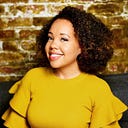Whose freedom are we celebrating?
Hey, ZORA Fam!
Two weeks ago, with many of us decked out in red, black, and green, we celebrated Juneteenth to commemorate the day that news of emancipation reached enslaved Black Americans in Galveston, Texas in 1865. All enslaved people in the United States were now free. The news, however, arrived in Galveston two and a half years after the Emancipation Proclamation was signed. This week brings us the Fourth of July, a day steeped in red, white, and blue traditions to mark our nation’s independence in 1776. At ZORA, we find ourselves reflecting on days that mark liberation, all while knowing that, in the U.S., not all of us are free. Annual symbolism isn’t the same as living a fully liberated life.
While parts of public discourse cover the general notion of who has it and who doesn’t, freedom, as we know, is also a very personal thing.
Did a friend forward this email to you? Sign up here. 📩
Freedom, for me, is defining myself for myself (word to Audre Lorde). Freedom is having the autonomy to determine who I am and what I will do in this God-given life. It’s rejecting the tradition — and conditioning — that women often find themselves at odds with; the kind that encourages us to contort ourselves for the palatability of people and environments that were never intended to serve us.
My freedom comes with joy. I delight in the fact that I’m designing my life the way I want it, even as I experience stultifying obstacles as a Black woman. My freedom also comes with setting boundaries. I feel most free when I say “no.”
⭐️ What is your definition of freedom? When do you feel most free? Let us know on Twitter. In the meantime, read more reflections on freedom from the ZORA squad, below. ⭐️
Take care,
Christina M. Tapper, deputy editor
What does freedom mean to you? When do you feel most free?
Vanessa K. De Luca, editor in chief: Freedom to me means that I have the privilege to navigate life unfettered by institutional and systemic racism. I feel most free when I am at home, surrounded by the people I love.
Adrienne Samuels Gibbs, features editor: Freedom is that elusive absence of worry about the million things I tend to fret about. I feel the most free when I am with very best friends, in someone’s backyard, laughing until the wee hours of the morning. To me, this kind of easy joy without fear is a kind of freedom.
Morgan Jerkins, senior editor: Freedom means to me to not tether myself to the fickle emotions of strangers and to define my boundaries on what does and does feel good or nourish me. I feel most free when I’m writing.
🎤 Having Our Say 🎤
This fear of swimming is an ancestral one, but Portia Bartley wanted to overcome it to know freedom. Here’s an excerpt from her story, How I Learned to Swim Away My Intergenerational Trauma.
Research studies show that 64% of Black children have little to no swimming ability. These statistics caught the attention of Tiffani Bryant, founder of A New Wave Aquatics. “I started doing research and found out the statistics for Black kids drowning were three times higher than other races. I started questioning my friends and family and most of them could not swim!” She told me “This definitely changed my vision, and my plan to get my people swimming… we’re traveling more and experiencing activities and sports that we never would have thought of in the past.”
These sentiments were echoed when speaking to Felicia Leatherwood. As someone who learned to swim recently, she had a personal connection when putting together a swimming event I attended last summer. “I wanted women to feel what I felt when I first learned how to swim, and that was a sense of freedom and confidence,” she told me. “I let the fear in me go about the water, and because of it, I’ve been able to be fearless with so many other things in my life!”
➡️ Read the rest of the story here.
👀 Honestly, If 👀
Moments we want to see more of… or never again.
Honestly, if Maya Moore doesn’t start getting the recognition she deserves, we will be shamefully overlooking an icon. Moore, one of the most decorated basketball players of all time, paused her career to fight injustice and helped free a man from prison. Sis is doing the work. Major props.
✨ The Best of Us ✨
News, art, and stories worth celebrating. All by or for WOC.
The freedom we witness watching Oumi Janta rollerskate is so refreshing.
Love plants? Gabrielle Hickmon explains how communing and engaging with plants has ancestral roots for Black people.
Gina Prince Bythewood of Love and Basketball fame has a new notch in her utility belt. She helms the superhero action flick of the summer for Netflix, The Old Guard.
The DACA decision needs to be firmed up with a pathway to citizenship, says writer Sara Hamdi.
Discover this Peloton community dedicated to Black women.
Scholar Eve Ewing breaks down why she capitalizes White.
Food justice activist Leah Penniman is making it easier for communities to become food sovereign and reclaim their rightful relationship to the land.
Here are five social-distancing date ideas from Feminista Jones.
🗣️ The Last Word 🗣️
“If Black women were free, it would mean that everyone else would have to be free since our freedom would necessitate the destruction of all the systems of oppression.” — The Combahee River Collective, April 1977
—
You’re subscribed to receive emails from ZORA. You can adjust your settings via the link at the bottom of this email.

